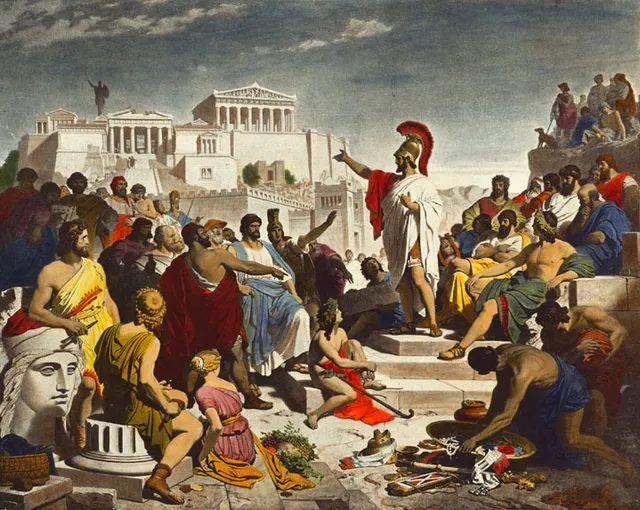Throughout history, our progress has been dictated by the leaders we elect and the decisions we make. Our political governance has the most profound impact on our future, and this article will offer my analysis on the question: Is the direction that political governance takes really safe in the layman’s hands?
Democratic scepticism is a concept as old as Socrates. With particular distaste for widespread democracy, for example the blanket ‘18+’ minimum voting age that most nations use, he was concerned that giving an equal say to everyone, educated or not, would allow for emotional manipulation of the uneducated majority. He thought that this would lead to political leaders and agendas being elected for entirely the wrong reasons, fuelled not by logic and sense, but hate. Socrates wasn’t alone, either. The United States’ Founding Fathers didn’t trust the common man to act in the nation’s best interests either, and thus were skeptical of direct democracy. To prevent the common man from making a disastrous and uninformed decision that would cripple the country, measures to protect the executive, legislative, and judicial branches were written into the constitution. It’s why American voters don’t have any input on federal judges, who are appointed by the president and can remain in their position for life. Until the ratification of the Seventeenth Amendment in 1913, senators were chosen by state legislatures and not their constituents. And it’s why the United States has an electoral college, the most epistocratic institution of all, and a direct blocker of ‘true’ democracy. Despite this, Western ideology has democracy so deeply rooted as this great bastion of freedom and equality, that it’s almost a shocker the majority of genocidal dictators shunned by the West were democratically elected. Mugabe, Hitler, Putin, Assad, the list continues.
It’s also become especially evident in recent times that true democracy is little more than a rosy ideal. It’s interesting that the very theory is rejected by both extremes of the political sphere; the national socialist fascists not wanting any possible challenge to supreme authority and the Kropotkin-esque anarchocommunists’ lack of trust in any elected leader to not misuse their given power. Through this, it is demonstrated that democracy is a uniquely centrist idea, but a true, pure democracy (something like proportional representation as opposed to FPTP) has been demonstrated to push politics to one extreme or the other. Although almost as old as civilisation itself, it keeps failing us. As Socrates put it, you would not trust the crew hand with the navigation of the ship.
In political systems with referendums, the issue extends. British readers of this article will be piecing together exactly what I’m getting at, and for the rest of you I’ll just blurt it out… Brexit.
Although still contested, it’s the opinion of almost all independent analysts that we shouldn’t have done it. A mere 33% of voters today still believe it was a good call – in fact, if we’re to play by the democracy rulebook, a slim majority of voters today believe we should undo it, according to YouGov. In relevance to our question, note it wasn’t a decision agreed upon with reason, rationale or sense. Rather, it resulted largely from an emotional manipulation of those particularly vulnerable due to a frustration with the status quo. Of those who were told that immigrants were taking their jobs, that they’d have more money for the NHS and that the grass would be greener on the other side. We’re 7 years down the road, and each of these claims has been proven partially or entirely false. Laid bare, the pitfalls of widespread democracy are evident. It’s too susceptible to manipulation and lies, especially in a hyper-digital age where information, true or not, spreads like wildfire.
The contention with the opinions set forward above is that by removing or altering democracy we give rise to elitism, taking power and decision-making from the many and giving it to the few. Who is to decide the ‘elite’ and who is everyone else? What are the criteria for these categories? These criticisms are entirely valid and are the main reason we’ve still got democracy today. Every alternative ever dreamed up can have hundreds of holes poked in it almost instantly. Socrates’ ideal alternative was a totalitarian regime, where the rulers have all been educated in ruling for decades before taking absolute power. History since Socrates’ time obviously warns us against such a proposal. However, even if we were to play around with the possibility of altering democracy somehow, let’s go back to Socrates and do what he suggested as the bare minimum: a test you’d have to pass before you could be allowed to vote. On surface, it makes sense. We apply it in other areas of life. You’re only allowed to drive after passing a test to prove you’re safe on the roads. We don’t let pilots fly planes without intensive training and examination. This test would have you prove you’d thought with careful consideration about the political circumstances surrounding your country and could be trusted to cast your vote in accordance with logic, sense and reason. However, the more analytical reader will have already faulted this idea in the fashion below:
Who writes the test?
Who marks the test?
What are the questions?
Does anyone have the right to define your careful consideration?
Wouldn’t it be biased towards the higher educated, who tend to be wealthier?
A flurry of other questions is easily imagined, and that’s just for a proposed limitation. The list of criticisms for its removal are endless. From this alone, it’s easy to conclude that it’s with us to stay. Is the steering of the nation safe in the hands of the people? Probably not, but human nature tells us that the people would never vote to give up their own power, and nor should they. There’s no viable alternative, and perhaps that in itself is the great curse of democracy.



